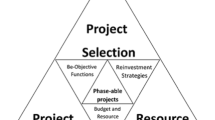Abstract
Traditionally, the model of a resource-constrained project-scheduling problem (RCPSP) contains a single objective function of either minimizing project makespan or maximizing project net present value (NPV). In order to be more realistic, in this paper, two multi-objective meta-heuristic algorithms of multi-population and two-phase sub-population genetic algorithms are proposed to find Pareto front solutions that minimize the project makespan and maximize the project NPV of a RCPSP, simultaneously. Based on standard test problems constructed by the RanGen project generator, a comprehensive computational experiment is performed, where response surface methodology is employed to tune the parameters of the algorithms. The metaheuristics are computationally compared, the results are analyzed, and conclusions are given at the end.
Similar content being viewed by others
References
Abbasi B, Shadrokh S, Arkat J (2006) Bi-objective resource constrained project scheduling with robustness and makespan criteria. Appl Math Comput 180:146–152
Agarwal R, Tiwari MK, Mukherjee SK (2007) Artificial immune system based approach for solving resource constraint project scheduling problem. Int J Adv Manuf Technol 34:584–593
Al-Fawzan M, Haouari MA (2005) Bi-objective model for robust resource-constrained project scheduling. Int J Prod Econ 96:175–187
Alcaraz J, Maroto C (2001) A robust genetic algorithm for resource allocation in project scheduling. Ann Oper Res 102:83–109
Ballestín F, Blanco R (2011) Theoretical and practical fundamentals for multi-objective optimization in resource constrained project scheduling problems. Comput Oper Res 38:51–62
Baroum SM, Patterson JH (1996) The development of cash flow weight procedures for maximizing the net present value of a project. J oper manag 14:209–227
Bomsdorf F, Derigs U (2008) A model, heuristic procedure and decision support system for solving the movie shoot scheduling problem. OR Spectr 30:751–772
Chang PC, Chen SH, Lin KL (2005) Two-phase sub population genetic algorithm for parallel machine-scheduling problem. Expert Syst Appl 29:705–712
Cochran J, Horng S, Fowler J (2003) A multi-population genetic algorithm to solve multi-objective scheduling problems for parallel machines. Comput Oper Res 30:1087–1102
Collette Y, Siarry P (2003) Multi-objective optimization: principles and case studies. Springer, New York
Davis K, Stam A, Grzybowski R (1992) Resource constrained project scheduling with multiple objectives: a decision support approach. Comput Oper Res 19:657–669
Demeulemeester EL, Herroelen WS (2002) Project scheduling—a research handbook. Kluwer, Boston
Demeulmeester EL, Vanhoucke M, Herroelen WS (2003) RanGen: a random network generator for activity-on-the node networks. J Sched 6:13–34
Derringer G, Suich R (1980) Simultaneous optimization of several response variables. J Qual Technol 12:214–219
Hapke M, Jaszkiewicz A, Słowinski R (1998) Interactive analysis of multiple-criteria project scheduling problems. Eur J Oper Res 107:315–324
Hartmann S, Briskorn D (2010) A survey of variants and extensions of the resource-constrained project scheduling problem. Eur J Oper Res 207:1–14
Herroelen WS, De Reyck B, Demeulemeester EL (1999) Resource-constrained project scheduling: a survey of recent developments. Comput Oper Res 25:279–302
Hyun C, Kim Y, Kin Y (1998) A genetic algorithm for multiple objective sequencing problems in mixed model assembly. Comput Oper Res 25:675–690
Knowles JD, Corne DW (2002) On metrics for comparing non-dominated sets. In: 2002 Congress on Evolutionary Computation, 711–716
Myers RH, Montgomery DC (1995) Response surface methodology: process and product optimization using designed experiments. Wiley, New York
Najafi AA, Niaki STA (2006) A genetic algorithm for resource investment problem with discounted cash flows. Appl Math Comput 183:1057–1070
Najafi AA, Niaki STA, Shahsavar M (2009) A parameter-tuned genetic algorithm for the resource investment problem with discounted cash flows and generalized precedence relations. Comput Oper Res 36:2994–3001
Nudtasomboon N, Randhawa S (1997) Resource-constrained project scheduling with renewable and non-renewable resources and time-resource trade-offs. Comput Ind Eng 32:227–242
Shadrokh S, Kianfar F (2007) A genetic algorithm for resource investment project scheduling problem, tardiness permitted with penalty. Eur J Oper Res 181:86–101
Słowinski R, Soniewicki B, Weglarz J (1994) DSS for multiobjective project scheduling. Eur J Oper Res 79:220–229
Ulusoy G, Özdamar L (1995) A heuristic scheduling algorithm for improving the duration and net present value of a project. Int J Oper Production Manag 15:89–98
Ulusoy G, Sivrikaya-Serfoglu F, Şahin Ş (2001) Four payment models for the multi-mode resource constrained project scheduling problem with discounted cash flows. Ann Oper Res 102:237–261
Viana A, de Sousa J (2000) Using metaheuristics in multiobjective resource constrained project scheduling. Eur J Oper Res 120:359–374
Voβ S, Witt A (2007) Hybrid flow shop scheduling as a multi-mode multi-project scheduling problem with batching requirements: a real-world application. Int J Prod Econ 105:445–458
Waligora G (2008) Discrete-continuous project scheduling with discounted cash flows—a tabu search approach. Comput Oper Res 35:2141–2153
Zemel E (1981) Measuring the quality of approximate solutions to zero–one programming problems. Math Oper Res 6:319–327
Zhang H, Li X, Li H, Huang F (2005) Particle Swarm Optimization-based schemes for resource constrained project scheduling. Autom Constr 14:393–404
Author information
Authors and Affiliations
Corresponding author
Rights and permissions
About this article
Cite this article
Khalili, S., Najafi, A.A. & Niaki, S.T.A. Bi-objective resource constrained project scheduling problem with makespan and net present value criteria: two meta-heuristic algorithms. Int J Adv Manuf Technol 69, 617–626 (2013). https://doi.org/10.1007/s00170-013-5057-z
Received:
Accepted:
Published:
Issue Date:
DOI: https://doi.org/10.1007/s00170-013-5057-z




